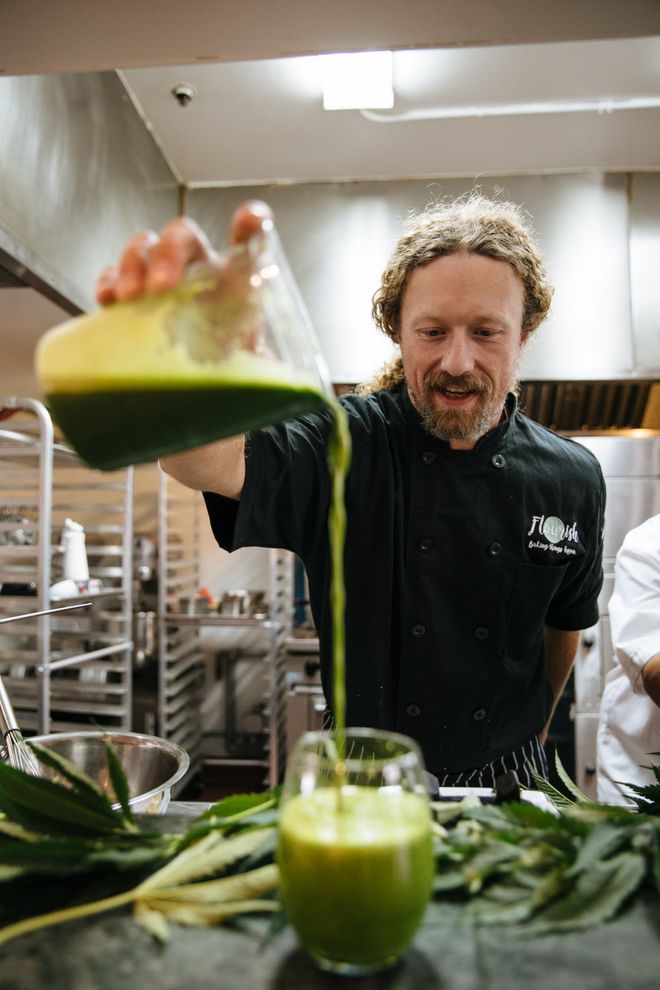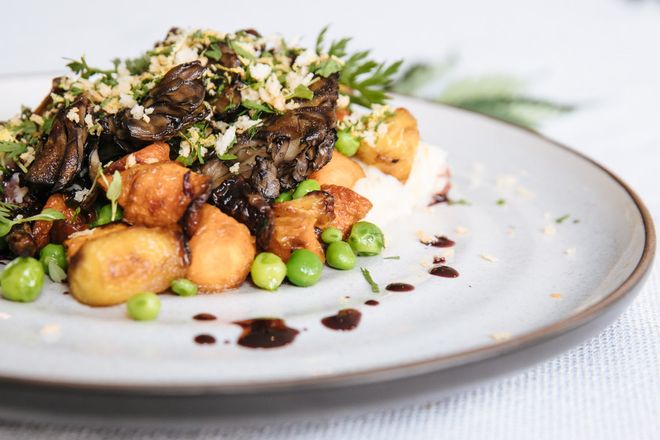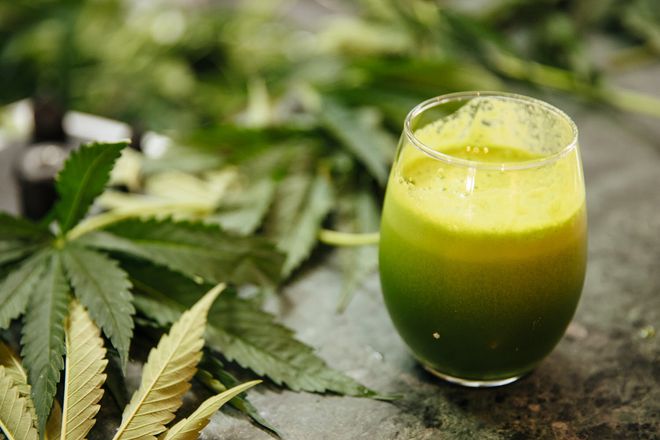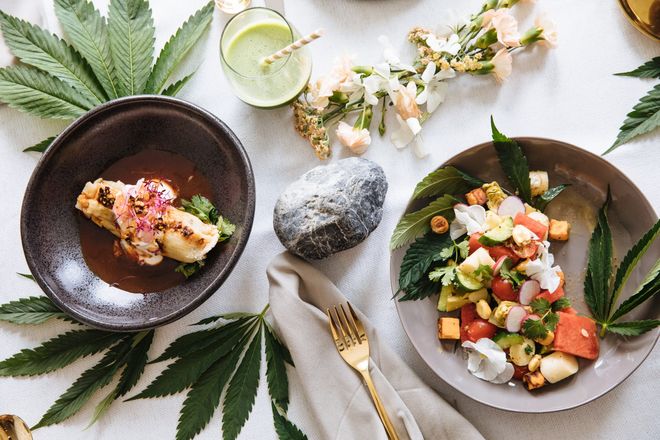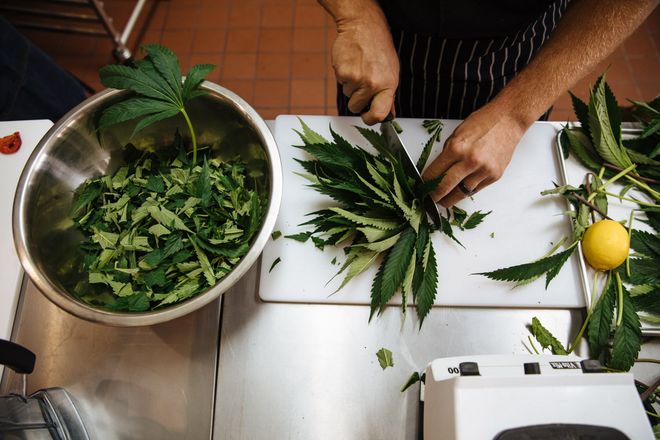Cannabis cooking community center opens in San Francisco

If you ask certain critics of marijuana legalization, edible pot products are a bane of civil society. But in San Francisco, edible pot is at the center of a new edibles community center concept by one of the region’s leading chefs.
Today, chef Payton Curry, one of GreenState’s top 10 cannabis chefs in America, launches Cannavore, a combination vegetarian cannabis restaurant, juice bar, vaporizer bar, yoga studio and edibles academy set in the city’s red-hot South of Market district.
Curry’s mission is to spread love for weed-laced food and drinks that offer no or low euphoria, while being singularly rich in nutrients from the raw cannabis plant.
“There are nutrients in cannabis that you will not find in any other vegetable on this planet,” said Curry, the founder of Berkeley’s Flourish Cannabis edibles company and a classically trained chef with Michelin-star restaurant experiencewho is to plant-forward cannabis cuisine what Willy Wonka is to candy and pure imagination.
Curry is enthralled by the ‘raw cannabis’ movement, which eschews heat or harsh petro-chemical solvents that sap cannabis’ nutrients.
Curry’s recipes can be as simple as juicing raw cannabis leaves straight from the plant. Raw cannabis plants can contain tetrahydrocannabinol-acid (THCA) which cannot get you stoned, but may treat inflammation and fight prostate cancer, lab studies show.
“We’re focusing on those phytonutrients in their raw state. Some of those phytonutrients get damaged simply when you cure and dry the plant,” Curry said. “Being able to maximize those nutrients from farm to fresh juice to soups and sauces is something that the human body hasn’t felt yet.”
Operating out of a freshly redecorated restaurant, Cannavore kicks off today with an open house and cooking demonstration for the media, followed by a drop-in juice bar and vape bar offering medical cannabis card holders free samples of raw sun-grown Humboldt County cannabis juiced on the spot, plus tastes of water-processed hash and a side of yoga in the studio beyond the dining room.
Cannavore will serve private, five-course cannabis dinners on Tuesday and Wednesday. On Wednesday and Thursday, cannabis brunches double as edibles lessons.
Tuesday and Wednesday’s dinner menus are $150 per person, developed by Flourish chef Domenique Garcia, and include salads of beet tartare and watermelon with hearts of palm agua chile; starters of creamy corn soup with barley and lobster mushroom salad and vegetarian posole with heirloom beans and hominy. Entrees involve sweet corn tamales and herb-basted maitake mushroom steaks, plus there’s cheese courses and family-style desserts including graham cracker fruit galettes and a Mexican hot chocolate bar; as well as cocktails containing cannabidiol which can reduce anxiety without getting you stoned.
Starting in September and running through the end of the year, Cannavore hosts monthly brunch-and-edibles-classes; plus the weekly juice bar, hash bar and yoga studio offerings.
A valid medical cannabis recommendation is necessary to enter all events on all days. But the community center could be test-run for a full-service cannabis cafe and culinary academy should San Francisco approve permits for such concepts. Local and state regulations covering edibles, restaurants and other cannabis-tinged concepts are being developed this year.
“Flourish would eventually like to have a Culinary Institute of Cannabis where you can take a two-week crash course and go from a $12- to $22-an-hour restaurant chef to owning your own cannabis cuisine catering company doing nutritionally beneficial cannabis cuisine for weddings and corporate events,” Curry said.
Eight states and Washington DC have legalized cannabis for adults 21 and over, and 29 states have medical cannabis laws. Critics have seized on cannabis edibles — which can look like normal food and can be hard to dose — as a key public safety issue alongside drugged driving. There is no known medical case of a fatal overdose on cannabis, but calls to Colorado poison control centers rose after legalization, before subsiding again.
New California laws and regulations are set to sharply curtail the state’s marijuana edibles offerings — reducing maximum dosages to 100 mg per package, and mandating 10 mg serving sizes for recreational products.
Curry hopes to show the nutrient-rich, no-high side of eating weed with his community center.
“Our plan is to show the community that we are not trying to get people all messed up. We are promoting wellness through the proper application of this plant,” Curry said.
For the raw cannabis juice, the proper application is simply the pressure of a juicing machine.
“Our juice is nothing but cannabis, coconut water and turmeric,” Curry said. “Plus a lot of THCA — the non-activated form of THC that spurs euphoria, not psychosis.”
The cannabis oils that will infuse this week’s brunch and dinner menus have an artisan pedigree as well, crafted by Flourish hash chef Jacob Bird using only water and pressure to achieve different flavor profiles — from citrusy to pungent, with varying strengths of pot’s main active ingredient tetrahydrocannabinol while retaining nutrients normally lost in more popular extractions done with butane, carbon dioxide or ethanol.
“This guy is a legend in old-world hash and he makes the most beautiful full-spectrum oil I’ve seen in my life,” Curry said. “That’s the future of cannabis cuisine because it’s not overrun by solvents.”
Oils are used in different ways in different dishes. A natural emulsifier, cannabis oil bolsters vinaigrettes and thickens sauces. Cannabis reduction replaces balsamic reduction as garnish on plates.
Curry said brunch and dinner menus will feature low doses of THC and high doses of THCA, with each of five courses dosed between 1 and 2 mg of THC. For those with higher tolerances, intermezzos throughout meals will offer as much 500 mg of THC.
As for THCA, Curry said, “Diners will consume a minimum of 1,000 mg per person with zero scientific possibility of a chemical conversion of the acid form of THCA to THC.”
Such a dose of THCA, Curry said, won’t get you high but will positively influence the cell structure of your stomach and aid digestion and absorption of phytonutrients.
Wednesday’s brunch class is aimed at home cooks who want to learn to make cannabis oils they can infuse into condiments — like homemade versions of Flourish’s new line of nutty chile crunk you can spread onto roasted meats and vegetables, plus marinara, wing sauce, ketchup and onion dip. Thursday’s brunch class will teach people who want to enter the edibles and cannabis cuisine fields information on processing concentrates, developing recipes and proper dosing.
Curry explained the price tags — $250-per-person for the three-hour home-cook class and $500-per-person three-hour pro class.
“It’s pretty much everything I’ve learned and discovered in the last 12 to 15 years,” Curry said. “It’s everything that I would have wanted and I would have paid $20,000 to do this instead of paying more than the 100 grand I’ve paid over the years messing it all up.”
IF YOU GO
Cannavore
WHERE: Folsom St. / SOMA
WHEN:
- Tuesday and Wednesday evening dinner.
- Wednesday and Thursday mid-day brunch and cooking classes. — Drop-in juice bar, vape bar and yoga studio 1-4 p.m. today, Tuesday, Wednesday and Thursday; then every Wednesday through the end of the year starting Sept. 6.
- Brunch and edibles classes one weekend per month through the end of the year starting Sept. 23.
HOW MUCH: Dinners $150 per person with medical cannabis recommendation. Brunch classes $250 and $500 per person with medical cannabis recommendation. Juice bar, vape bar and yoga studio free with valid medical cannabis recommendation.
TICKETS: Available via Eventbrite
MORE INFO: FlourishCannabis.com.
